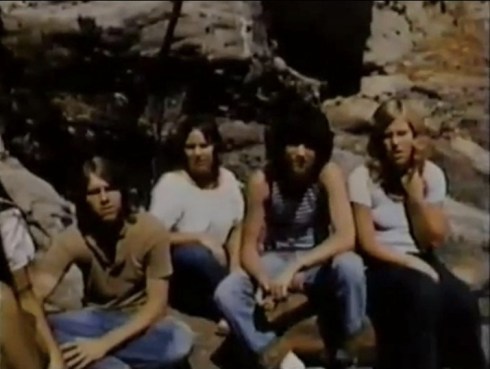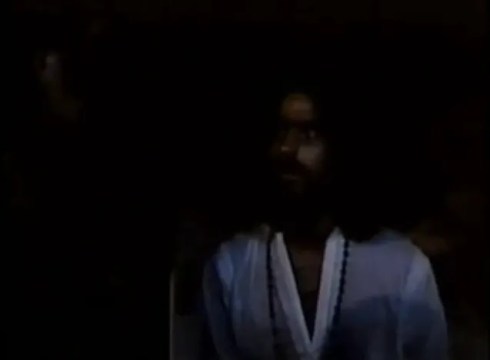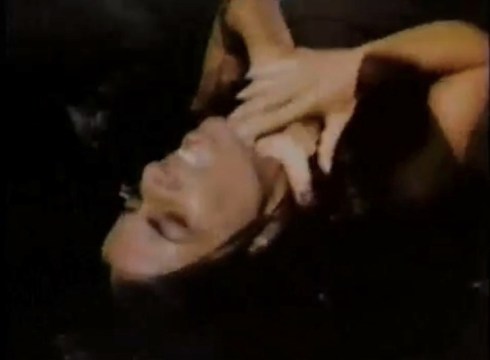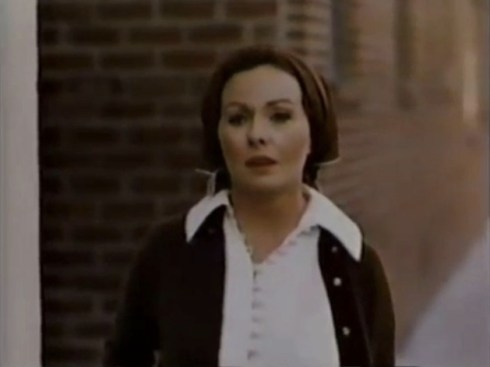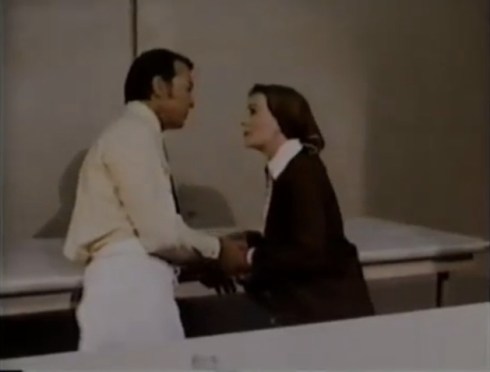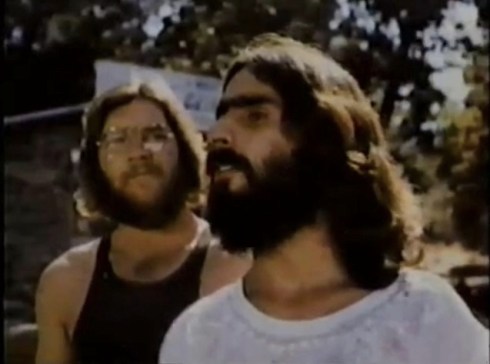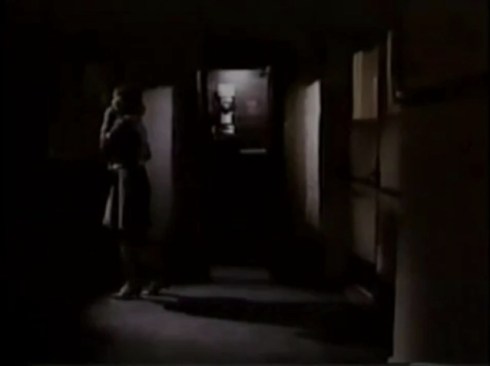“Scream – So they’ll know where to find your body!”
THE NIGHT GOD SCREAMED (1971)
Directed by Lee Madden (Angel Unchained 1970, The Manhandlers 1975), he offers us another cult hippie psycho drama feeding off the unsettling vibe and turbulence of the Charles Manson hysteria.

No matter how often I think I’ve uncovered the most obscure cult thriller, there’s always another lurking under a rock somewhere for me to feast my wide-eyed stare upon, mouth agape, and mind working over time to integrate the confluence of cultural debris that emerges like the dregs when you roil the sediment secretly settled on the bottom of the cinematic barrel. This is one such obscure film.
Starring screen beauty Jeanne Crain (Leave Her To Heaven (1945), Pinky (1949), A Letter to Three Wives (1949). The Tattered Dress (1957).

Who probably would have rather been given a better role and script, plays the frail and persecuted Fanny Pierce. Alex Nicol plays Fanny’s husband, the man in search of his own prosperous church in a better neighborhood. Preacher Willis Pierce (How could we ever forget Nicol’s wonderfully grimy, pathetic, and bizarre character Mickey in 1958s The Screaming Skull, or his dizzying performance as the drunken loser husband Jay Fowler in Look in Any Window 1961) No… he’s gotten to play a man’s man plenty, but he is sort of a victim magnet.


Dan Spelling plays the bourgeois Judge Coogan’s son and the irritatingly preppy Peter. Barbara Hancock plays sister Nancy Coogan, Dawn Cleary plays sister Sharon, and very busy actor and stuntman Gary Morgan plays little brother Jimmy.
The Night God Screamed opens with a foreboding shape floating as if gliding on top of water, through the eerie sylvan landscape wearing a monk’s robe, his large, draped cowl-like hood obscuring the man’s face altogether. He grips an arcane cruciform staff. He approaches a small pond inhabited by the frolicking free love rejects, society’s much-reviled flower children of the ’60s & ’70s sub-subculture. In other words, as South Park’s irreverent and outrageous Eric Cartman would say, ‘dirty hippies’ have lots of random sex and get high.
The pervasive cut-off tone reveals that they belong to a Manson-esque cult, which is led by the vitriolic Billy Joe Harlan, a fanatical cult leader who baptizes a few followers and then proceeds to spout a trippy fire and brimstone rant, his own distorted anti-socially virulent version of the Gospel. Much like Manson, his rhetoric engenders a lot of animosity toward the establishment, law enforcement, or, if you will, ‘pigs’, citizens, squares, and anybody who doesn’t see the world through Billy Joe’s lens.
Billy Joe is a violent sociopath who commands his fledgling minions to destroy any phony preachers, combat pigs, and try to bring his new version of the Gospel to the youth of America.
Hung up on how Christ was betrayed, he riles his flock of murderous flower children to manifest the power to punish those who do not follow his gospel. To make an example of the dangers of dissension and betrayal, he chooses a young girl who has refused to be baptized. And so he gives the word to his faceless, hooded angel of death named ‘The Atoner’ to drown her in front of the flock.
“They was all just a bunch of sinners, Lord, fighting and bothering each other…But I saved them, Lord! I showed them that using dope was the way to turn on to You!”
“We got trouble! The Heat won’t leave us alone! They want to bust us for being hooked on you! Them pigs is watching us, Lord…they don’t dig our kinda thing!”
As this soldier of God, known as THE ATONER, executes the young girl in front of the mindless youth, the rest of the nasty flock watches without doing a single thing to help the poor girl as she is submerged under the baptismal waters, causing her to drown.
The film cuts away to a scene where the wife and good Christian Fanny Pierce (Jeanne Crain) is bringing groceries to the mission where her preacher husband (Alex Nicol) is feeding a hungry collection of bums and down-and-outers. Right before she can make it inside with her bag of groceries, a very unsavory bum with quite an unattractive tongue, mugs her for the brown paper bag of food, leaving her standing ironically empty-handed and assaulted right outside the very soup kitchen where she and her husband have been trying to bring the good works of Jesus to these poor destitute men.
Fanny starts to have her own crisis of faith and becomes disillusioned with her husband and his mission. Preacher Willis Pierce appears more worried about the loss of the groceries than concerned for his own wife’s safety. He possesses a resolute patriarchal hubris with his grandiose dreams of bringing the gospel to his people, much like Billy Joe, yet not imbued with vengeful and malevolent fortitude.
Willis wants to build a sizable church in ‘better areas of town’, which would mean more money, more offerings, and more notoriety to his name. This is the kind of man Billy Joe despises and is on a crusade to annihilate with his cult of venomous sycophants.
Fanny tells Willis, “God isn’t going to make our house payment!”
In a ridiculous gesture, Willis’s scheme is to erect his new mammoth wooden cross at the revival meeting he plans on holding later that night. He believes that this will help bring in enough cash for ‘offerings’ to start up his new church. So, without consulting Fanny, Willis spends an enormous amount of money on the large, ludicrously enormous artifact that symbolizes Jesus’ sacrifice but smacks of Preacher Willis’ own egoism. He has used all their savings on this religious ‘manstrosity’, that he will erect in the revival hall, which he has rented in a more affluent part of town.
As they haul the large wooden totem across the countryside on top of their old truck, the tension between Fanny and Willis grows. Fanny tells Willis that she’s sacrificed over twenty-five years of her life in service to his cause. Willis tries to convince her that the giant cross will be their ‘meal ticket.’
While stopping at a gas station, Billy Joe and one of his religious biker culties Izzy (Richard Smedley Brain of Blood, The Abductors 1972, The Naughty Stewardesses 1975 ) espy the Pierces and their truck with the cross-tied on top and pull in alongside them with their motorcycle. It’s here that sets forth the moment of confrontation with fate, and the narrative’s tragic and violent relinquishment of faith sparks.
Billy Joe begins to question Preacher Willis, fascinated with his sizable wooden cross, and wants to know what he plans to do with it, asking about the plans for the revival meeting.
It is a moment that points out the deliberate contrary notions of religion while simultaneously forging an ironic relationship between the extreme zeal and the unfettered fanaticism of the two self-styled evangelists.
Willis is prideful and enthusiastically offers his fund-raising motivations for his ‘mission’. Billy Joe begins to formulate his vexation and sets out to dispense Willis with his wrath for being a false and ‘plastic prophet’. As the Pierces continue on their road trip to the revival meeting, Billy Joe summons his nefarious apostles and unleashes his craving to destroy Preacher Willis.
“We’re going to a revival meeting tonight… We’re going on a crusade! Just you, and me, Izzy… And the Atoner!”
Preacher Willis gives his sermon at the College Lecture Hall. Unfortunately, the congregation does not bestow upon him the funds needed for his plans to build his church in a ‘good’ neighborhood. After the sermon, Fanny and Willis’ assistant Paul go outside, leaving Willis alone in the revival hall.
In a scene that is quite disturbing, as the events happen mostly in an utter bluish darkness or diverted to the realm off camera, the cult attacks Willis. They are draped in shadow. Billy Joe begins to persecute Willis, pronouncing him a ‘ false prophet’ and demanding that he be put to death. And so while Billy Joe’s followers restrain and torture poor Willis, the Atoner slowly and painfully nails Willis to his own mundanely magnificent cross.
Fanny is startled by the screams of her husband, who is crying out in agony. She comes back inside the hall, but shrouds herself in the darkness, afraid for her own life, as he cries, “Fanny, Help me, For God’s sake, Help me.” She remains motionless, doing nothing to help him; he is left to die alone, now a Christ-figure of the film.
The scene switches to a courtroom, where Billy Joe and his cult followers are all on trial for the murder of Willis Pierce. Judge Coogan pronounces a death sentence on the hippie messiah. Billy Joe explodes into a tirade.
“You son of a bitch! You DUMB son of a bitch! YOU’RE MAKING ME A MARTYR! AHAHAHAHAHA!”
While Billy Joe is convicted and sentenced to death, the remaining cult members encircle and besiege Fanny, vowing revenge for Billy Joe. Fanny, who was already starting to devolve in her encumbered world, now anguished with guilt for not having helped her husband Willis in his moment of horrific need, wanders away in a somnolent haze.
She remains in this state of dissociation for the rest of the film. The judge hires Fanny as a sort of matron to help with his two sons and teenage daughters, who need to be kept in line, shown morals, and keep from acting too wild while their parents go away on a weekend vacation. The Judge grounds the kids and makes them stay in the house with Fanny, who is still wholly uptight and out of her mind with guilt over her husband’s brutal death.
This breathes even more agitation into the film, which is saturated with male hubris and female hysteria. The archetypal hysterical woman lives once again in the embodiment of Fanny Pierce.
On the way to bringing Fanny to his house for the weekend, the Judge dismisses her worries about the two hippies on motorcycles who seem to be following them and then goes on to instill some social relevance in the bigger picture. “Those kids, like the ones who murdered your husband… they come from broken homes… poor education… they’re just dropouts! Not like ‘my’ kids!”
Of course, we are to understand that this is a cue of foreboding irony, reflexive and dilating, as Fanny is charged to take care of the Judges adult teens, who inadvertently become mixed up in the nightmare, as the Atoner and remaining worshipers take siege of the household and terrorize Fanny and the teenagers. Fanny becomes even more unhinged, amidst an ensemble of entitled youths who are the binary figures of the film’s contemporary youth culture. One set of outliers rebelling against a system that reviles them, and the other is just as combative and anti-social, yet given the opportunities to reflect their personal freedoms because of affluence and social capital. Dan Spelling as Peter Coogan, the judge’s eldest son, is a bit of a social superior, a quiet sociopathic teen whose poison is brewing under the surface of his perfectly pressed pants and yuppie tennis sweater.
Is the film’s fixation in the beginning, with its over-emphasis on the dark and seedy underbelly of society, trying to make the point that there are no good guys and that there is no redemption?
Are we all doomed to be sacrificed? Are we to be either villains or victims? The hardened focus on the downtrodden faces, the visual examination-or, I should say, preoccupation—with the seamy side of life and its fallen figures is not lost in the way the film is framed around Willis’ Mission. The composites of the homeless men are framed in quite a pejorative, exploitative, objectifying manner, creating a conflict for us to sympathize with these otherwise marginalized figures.
Does this film then create controversy as did photojournalist Shelby Lee Adams, whose photo essays, such as ‘The True Meaning of Pictures’, of the poor Appalachian folks, some felt emphasized the darker aspects of poverty and appeared to some as to frame their existence as unattractive and unwholesome, as well as self-inflicted. The Night God Screamed, one could say, uses its visual cues as a way to depict the poor as nefarious predators, dangerous and not worthy of redemption or compassion. The world in this film is a dark, dire, and nihilistic place inhabited by human failings, frightening predators, false prophets, and faint victims who seem to call the wrath of god upon themselves., showing the intersectionality between religion and class.
Willis tries to inflict his savior complex on men who do not want to be saved but merely want a warm meal. Thus, his grandiose intentions remain futile, and his hubris is exposed as egoism in his quest to be Christ-like.
Billie Joe is an anti-Jesus figure. Whereas in Pale Rider, Clint Eastwood appears as an apocalyptic avenger, Billie Joe’s character is a dark and malevolent inversion of the Christ—a figure setting out to expose hypocrisy through violence, egoism, and mind control. He is the antithesis of what Christ represents, yet he wields a strange hold over his flock of followers, invoking the name of Jesus or Lord to assuage his blood lust.
In Peter Malone’s book MOVIE CHRISTS and Antichrists, Malone states in Chapter 5 A Key Distinction: Jesus-figures and Christ-figures page 18 “The Christ- figure, it is suggested, can be a redeemer-figure or a savior-figure. These categories are not mutually exclusive. The particular focus of each is what is emphasized.” He continues,”Redeemer-figures -representing Jesus taking on human burdens and sinfulness in suffering, even death. Savior-figures- representing Jesus’ saving mission, even to triumph and resurrection. Martyr-figures: Suffering and death as a witness to values and convictions. To add one more additional statement from the chapter, ” In a world of evil and sinfulness, there have always been personifications of evil. The New Testament uses the word ‘antichrist’ Considerations of Christ-figures must include consideration of antichrist-figures.”
It could be said that Willis is the true Christ figure of the film, considering his graphically literal death by crucifixion and his mission to save souls. While Billie Joe acts as a counter-balance, the Anti-Christ figure is explicitly and implicitly present in order to form the narrative’s conflict.
From Chapter 27, Good and Evil Strangers, page 105, of Malone’s book, “We are contradictions to ourselves, sometimes split personalities. Shadow images reveal our evil. They can also show us our potential. These figures are mysterious strangers who, like Jesus in his ministry, are ‘signs of contradiction.
The Night God Screamed is a film inhabited by a different kind of boogie man; it is permeated with the confrontation of two opposing yet symbiotic binaries of social order. The world of the elite dominates the weaker with a vision of ruthless pride and an iron grip on moralistic privilege. And the outlier who sees themselves as the David to their Goliath, yet filled with the same dangerous myopic worldview, so marginalized, that they come to believe they are the chosen ones who are entitled to the freedom they can only attain by annihilating the oppressor, the ruling class, in other words, the establishment. Just as in Angel Angel Down, We Go 1969, and the character of Bogart Peter Stuyvesant. Billie Joe’s violent delusory mania fuels his belief that he’s been given the ‘power’ by Jesus himself to condemn false plastic prophets.
Rather than ethereal phantoms that visit upon us an uncanny sort of shiver in our collective unconscious nervous systems, we get triggered by these real-life ‘social, criminally insane demons’ such as the nefarious Charles Manson, or Kool-Aid slinging Jim Jones.
The very false prophets that Billie Joe reviles, he manifests himself by way of his own egoism and psychological displacement. These Anti-Christs create an enemy so that they have someone and something to destroy.
But once the conflict is sparked, only chaos emerges. There is no dialogue, there is only death. Billie Joe is far more corporeal; he is plainly materialized so much more than Emily/Abigail in Let’s Scare Jessica To Death. And though Emily might have vampirized the entire county, Billie Joe’s kind of venom can spread wider and cut deeper. Religion has been a far more dangerous weapon in the hands of mankind than the fairytale monsters who haunt our nightmares.
Just to tie in Part I of this two-part post, I’d like to add this about Let’s Scare Jessica To Death and the idea of ‘death and sublimation’, using Jessica’s inner turmoil manifested as her secret voice.
Referring to Death and Sublimation: in Slavoj Žižek’s Enjoy Your Symptom– he talks about Death and Sublimation in regard to the works of the great silent screen icon Charlie Chaplin in particular to his performance in City Lights 1931.
In his Chapter, Why Does A Letter Always Arrive At It’s Destination? 1.1 Death and Sublimation: The Final Scene in City Lights- The Trauma of The Voice. Slavoj Žižek discusses the point of the “intrusion of the voice’ ‘It functions as a strange body which smears the innocent surface of the picture, a ghost-like apparition which can never be pinned to a definite visual object;and this changes the whole economy of desire, the innocent vulgar vitality of the silent film is lost, we enter the realm of double sense, hidden meaning, repressed desire – the very presence of the voice changes the visual surface into something delusive , into a lure: “Film was Chaplinesque, it will become Hitchcockian.”
While Žižek is referring to the advent of sound and Chaplin’s aversion to inserting the mechanism of voice into his films, what’s inherently pertinent here in terms of relating it to Let’s Scare Jessica To Death is how much Jessica’s inner monologues transform her narrative as well as the film’s atmosphere into an even more unary vision, an altered piece of ‘double sense and repressed desires.’
Okay, so… back to The Night God Screamed.
The film starts out with ambient atonal bells and chimes set against the visually threaded trees that hint at a summer sky all pale blue and a queasy hazy yellow.
As the frame moves into a murkiness that obscures the screen, the camera crawls along the hint of woodsy grass. The fractured tinkling of the bells still sprinkles the opening with its delicately disorienting sound.
The glacial music slows to a halt, and a more ominous texture of dissonant guitar chords develops as we begin to hear the footsteps and see someone walking through the shaded woods—a shadowy figure, a silhouette in progress, shifting through the sheltering canopy of the shaded woodland.
We can make out the image of a large wooden staff. Voices obscurely deferred to distant surrounding trees seem to rise from the ground as the figure now trudges through the woodland.
Now in focus with his back toward us, we see the impression of a monk’s robes. A sort of Medieval vestment, brown and arcane, the staff materializes as a cruciform. The figure is in the center, framed by the tree growth. The voices become louder, also sounding almost Medieval in their metrical intonations. Not quite chants, yet monotonous drones of ritual chatter. An ominous prattle. Muted pronunciations accompany the large robed figure as it walks with purpose.
The frame closes in on the hooded figure. The words become more coherent. One distinct vocalization is forming, it is ‘Hallelujah’ floating above the muffled voices of the eerie metered canon.
There is a sense of macabre consecration to the moment. The atmosphere is queasy like the yellowing sky poking through the trees earlier. We can not see the face of the hooded figure who has now moved closer to the water’s edge, a lake perhaps, a quiet watering hole, a secret place to hold a clandestine rite.
Now we see more clearly, a collection of young people, splashing in the water, clapping their hands, rejoicing in their afternoon celebration. Some sitting on the scattered rocks that jut out of the water’s edge. The Cruciform is framed to the lower right of the screen, the first reoccurring fetish, is the ‘cross’ totem as we gaze upon it as the film starts to unfold.
A long-haired man in a long white gown wetted by the water is holding a young woman, another young man runs to the girl. We can not hear yet what they are saying. But it appears almost as if it is a baptism. The flock is clapping, we hear ‘praise the lord’, and the figure in white raises his arms to the sky in observance of heaven above. The other young man in the water grabs the girl, seemingly against her will.
Now the group in unity is raising their hands up to the sky more vehemently with their praising of the lord. The guy is dragging the girl to the shoreline. The figure in white wades through the water now. For a brief second, all you can hear is the quiet air and the ripples of the water. The flock has hushed itself to listen to their master. He is now framed in the center of the screen, appearing Jesus-like in his pose and orientation. Wearing love beads, hands clasped at first, then reaching open and outward toward the sky, his profile gives him a saintly guise at first. If the frame were to stop here, we would think this might be a public service message from the Church of the Latter-Day Saints.
With the sound of the cleansing rumbling water behind him, he closes his eyes, and holds his hands out even further, a devotee, an angel, or is he an ungodly water ‘puck’, a malefic chosen one in milky white garments, an evil sprite, a conjuror in muslin regalia, a dangerously orthodox torchbearer of vile animosity, a Christian hoodoo cult leader, a mind controller of little vagrant lambs, a dirty stinking hippie freak, or all of the above?
He begins his brief homily in a voice as gauzy and as slow as a tiny piece of refracted summer light, “Oh lord, we are your children, you have brought us all together, show us the light, giving us a chance to be saved.”
Then he seems to turn inward, clasping his hands to his heart. “Giving me the power. I am your son, oh lord.” Now he begins to gesticulate as if he were a rock star, faintly conjuring the body language of Jim Morrison of The Doors without the drop-dead sensuality, of course, his stage is the water’s edge, the heavens his pulpit, and the malleable minds of the youth he preaches to his enrapt audience. This man, after all, seems to be a superstar in his followers’ eyes.
He turns and smiles at his young audience, as they clap for him. “These all just a bunch of sinners lord, fighting and balling each other, but I saved them. I made them see that using dope was a way of turning onto YOU.” In the background, a faceless voice chimes in, “Amen, brother.”
The camera frames him standing in the water, giving blessings to his fellow flockery.
He continues his sermon, remaining devoted to the sky, “Oh, we got trouble, lord, the heat won’t leave us alone. They want to bust us for being hooked on YOU. They don’t like us practicing our faith, they don’t like us getting high. Them PIGS is watchin’ us, lord. They don’t dig our kind of faith. They put us down, because we ain’t one of them uptight establishment churches with one of them phony, money-making ministers lying and stealing from the straight dummies and getting rich!”
He points his one finger up, reaching toward the sky, because that’s where god is. He pauses, and another faceless voice interjects, “Praise the lord.”
“So we need plans, lord. Plans to off them, phony preachers. Put the fear of god in them, so they won’t steal from the plain folks anymore. The PIGS think they’re gonna stop us and protect them false prophets. Someone who acts like one of our own to spy on us and try to bust us.”
He starts to move closer toward a huddle of his followers. “There’s a chick, that don’t want to be bap-tized.” His words, a consuming and sedate tempo, carry his message, drawn out and dense with psychosis. He moves in even closer toward the young girl. The rippling movement of the water is a natural sound that underscores his soliloquy.
“She don’t want to follow me. Cause she don’t believe in your way. She don’t want to line up with you through me and Jesus.” (ah the delusional hubris of Mr. Water Monkey Unibrow.)
Now he starts to modulate his voice to where he begins to show his true mania and his culminating ire.
“Oh, yes, Lord, in our happy flock, maybe we got us… a Judas!” He points his finger toward the girl, the way villagers used to point at suspected witches.
The camera shows us who he is gesturing to. Finally, music accompanies the scene. That notorious rhythm is used to set up the inevitable conclusion. She realizes that she is in imminent danger and starts out in flight, but the surrounding gang begins to grab at her, preventing her escape.
Two young men carry her, literally kicking and screaming, pleading for her life. Strident and urgent strings accelerate the scene. Low-octave piano notes in a variation of disturbing fourths, the fourths of doom, accentuate the impending moments that are now erupting in violence. She looks at him and utters his name, “No Billie Joe, I’m not a fink.”

“You don’t want to be saved.” Billie Joe says to the panicked girl,
“I’ve been saved. I gave up everything for Jesus.”
“But you ain’t been bap-tized” he says like an innocent little boy who didn’t get to eat his cookies after lunch.
She shakes her head and pleads, telling him that she’ll do whatever he wants. He stands there, closed in by the camera, more Manson-like now than Jesus. Looking away, he calls out for ‘The Atoner.’
Suddenly, the hooded figure comes into view holding the cross-like staff. The piano fourths start rolling again.
“Anybody who goes against God’s law has got to ‘A-tone’ for it,” He pronounces with a special emphasis on the A.
The Atoner, hooded wraith, a faceless executioner exuding a historical sense of Medieval blood lust, takes the girl and begins to submerge her in the water, a mock baptism, he mercilessly drowns her in the water. Billie Joe raises his hands clasped together, as the girl’s lifeless body floats up to the surface, struggling no more.
Now the titles emerge on the screen, The Night God Screamed as the ripples from the now undisturbed water form to the right of the title. The scene abruptly cuts to Jeanne Crain, who plays Fanny, walking down the street, a hurried piano’s notes beat on the keyboard like ardent scales driving the mood like a darkly toned variation on Nikolai Rimsky-Korsakov’s “Flight of the Bumblebee”, as her pace is quick, almost furious.
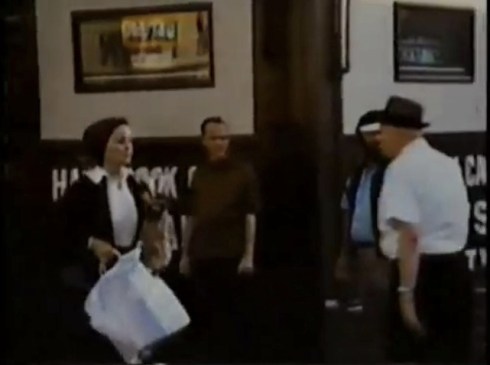
The music by Donald Vincent is perfectly unsettling, as the strings strike out almost in the same vein as with Bernard Hermann’s score in Psycho using string stabs to accentuate the mood, again to create the sense of disorientation and urban dismay, as Fanny continues to walked past various unsavory characters while holding her brown bag of groceries, the unsettling music propelling her steps to get her to where she’s going. Heading toward her husband, who is serving meals to the homeless men at his mission.
The piano scales stop on a low chord that rings out, as a queasy string melody takes the point of view of the camera and walks us through another set of unkempt men standing around the street. The sense of alienation evokes for me the townspeople in Let’s Scare Jessica To Death, although not a rural setting, it gives the sense that we are outside the realm of comfort as we are outsides amongst these other ‘outsiders’, these ominous foreboding characters ogle Fanny, outliers of society which rings familiar to me as when Jessica and her husband first arrive on the Island and are met with the same kind of stare down and an odd resistance. Director of Photography Stephen Larner does a great job of making us feel like ‘outsiders’ ourselves, along with Jeanne Crain’s character. Filmed with a raw and dispirited vérité.
As Fanny rounds the corner of the building, where the neon sign prominently boasts the catchphrase “Jesus Saves,” we hear her inner monologue: “Everything is ugly and old.” She stares at the Pray for Peace poster in the window. Accosted by a scruffy-faced bum outside the Chapel, the camera closes in on his surly, toothless expression. The friendly gospel music emanates from within the chapel, creating conflict with the nervous moment of affairs.
Fanny stands still, as the bum eyes her bag of groceries, then quickly grabs them and takes off, leaving her standing mouth agape, as she calls to him “Trust Jesus come inside and we’ll feed you” Her voice trails off, disbelieving her own words, as the disillusionment washes over her. Larner’s use of color and the camera’s long shots are slightly reminiscent of artist Winslow Homer’s mood and character studies, or even more so somewhat like that of Edward Hopper.

Now inside the mission/chapel, Willis says to one of the hungry flock, “It’s not steak, but a gift from Jesus. He hasn’t forgotten you, brother.” The man quickly chides back at Willis, “He wouldn’t have a cheese sandwich, would he, Father?” “Oh, I’m not a priest brother, just a preacher of the gospel, you can have anything you want if you just step into our chapel and side with Jesus.” The man says, “Well, I’ll see how my schedule works out,” and walks away.

Willis looks toward the man as he walks away, as he continues to serve the hungry homeless pouring in at the food line. As Fanny walks over to him, he asks if she got the food. “A man stole one of the bags almost right in front of the door.” “Oh Lord, what did he get?”Frustrated, she tells him, “It doesn’t even matter to you that I might have been killed. These men are not dangerous.”
Fanny doesn’t summon up much emotion but manages to express this, “I’m drowning, Willis.”
It is this statement of Fanny’s that becomes less of an implicit qualifier of Fanny’s repression, this sold statement manifests more explicitly Fanny as a subject of ‘death and sublimation’ in varying degrees. “Please, Fanny, this is our work.”
“Your work,” She turns away from him. The camera continues to spotlight the downtrodden men surrounding this fractured couple, to illustrate the chasm between the work that Willis is doing and the slender thread their marriage is hanging by. The disconnection is evident, and the sense of Fanny’s hopelessness is augmented by the sterility of the environment. As these anonymous men continue to feed their faces, Willis shows no empathy for her having been accosted by the bum. She is merely told that they are not dangerous, an augury of sorts letting us know that danger is quite near, brought about by Willis’ short-sightedness.
He tells Fanny that he’s rented a hall in the good section of town. She looks at him while wiping off the long tables from the muck left over by the homeless diners. Wearing a dowdy rag on her head that further serves to sublimate her womanhood, she continues to wipe off the surfaces as he tells her it’s for the revival meeting, he’s sure they’ll get better offers. Fanny rolls her eyes at him and turns away, continuing to wipe the tables.
“Now Fanny, someday we’ll build our own church.” “We’re never gonna build a new church, never” “As soon as we have the money.” ” There hasn’t been enough for twenty-five years.”
The camera cuts away to the men eating. We hear Willis tell her, “You got to have faith.” As she exasperatedly brushes him off about his preaching, she says, “Fanny, I don’t know what you want me to do.”
She tells him, “I don’t know you.”
“It’ll be different, when we build our own church you’ll see”¦ we’ll have our own permanent congregation.”
We only hear him speak; the dialogue floats as the camera crowds the two out, fixating on the various collections of the homeless and hungry. This is what has crowded Fanny out of her marriage. “These transients looking for a free meal, you won’t have to clean up anymore.” He assures her. “I’ll bet I can reach the young people. You know, a lot of them are just waiting, waiting for someone to talk to them. Come on, it’ll be wonderful, won’t it, Fanny?”
Again, the camera obscures the two talking as it focuses on the array of underprivileged faces walking in line for a free meal. We hear Fanny answer “Yes, Willis,” and the scene suddenly cuts away to them driving in their old truck with a large wooden cross tied to the top.

“What happens when we run out of money?” he replies, “God’s will.” “God isn’t going to make our house payment, Willis.” He insists, “Friday’s usually a good night for the offerings.”
She begins to complain about how there won’t be any money left over after the revival. He tells her, “Fanny, that cross only cost $50 labor and materials. I still say it’ll stimulate the offerings.” “And if it doesn’t?” “Then it’s God’s will.”
As Willis and Fanny pull into a gas station, Billie Joe, riding on the back of a motorcycle, spots the truck with the giant cross and pulls in alongside. He jumps into the truck and runs his hands along the wood. Willis looks on as Billie Joe lies upon the cross in Jesus’ crucifixion pose. “This belong to you?” ” Why yes,” “It’s a might fine cross.” Billie Joe kneels down to face Willis, who thanks him. “What are you gonna do with it?” “I’m going to use it in my work, I’m a minister, very impressive, don’t you think?”
“Where’d you do your work?” Billie Joe quizzes him.
“Well, I’m evangelizing tonight to raise money for the mission I run downtown. I rented a hall at the park. You and your friend are welcome to come. “ Billie Joe says Thanks. “Who knows, you may want to come forward and be saved.”
“Saved from what?”
“What… well, from Damnation, of course.”
“Ha, damnation, haha, damnation.” Billie Joe chuckles, climbs out of the truck, and continues to laugh the words, damnation. Raising up his arms, he shouts- “Damnation!”
Billie Joe’s sidekick Izzy walks around the truck toward Fanny, “Whooey, this vehicle must be worth a heap of money.” “Oh no, it’s just a tired old truck.” “Sometimes, old is better, isn’t it?” “I suppose so.” “Myself, I prefer the older stuff,” he eyes Fanny salaciously. “Seem to be more appreciative of good handling, and I can handle it real good.” He fondles the outline of the car as if he’s caressing Fanny’s body. “That gentleman over there your husband?… don’t make any difference.” He opens up the car door and moves in closer.

The camera pans back to Willis and Billie Joe. “You expecting a big turnout?” “Oh yes, I expect a big crowd.” “Make a lot of money then I suppose.” “Oh, that depends upon the neighborhood. Should be pretty good tonight. We’ll ah, maybe I’ll see you there.” “Maybe you will…”
As Willis gets back into the truck, he tells Fanny, “Probably part of those silly cults the kids are always coming up with.” They take off, and Billie Joe and Izzy stare at them as they pull away. “I think we’re going to the revival meeting tonight.” “We are?” “Yeah, we’re going on a crusade, just you and me Izzy and the Atoner.”
They pull up to the hall. A man named Paul greets them at the curbside, where Willis asks what he thinks of the cross. “Well, not being a carpenter, I guess it’s pretty good.” “Well, being a carpenter himself, I think even Jesus would be proud of it,” Willis answers proudly.
Fanny watches as Paul and Willis move the big wooden cross onto the stage. The scene cross-fades into Willis giving his sermon, “And so never forget we live by three laws, nature’s, man’s, and God’s. Nature’s law is survive. Man’s laws obey, but God’s law is love. The pressures created by such divergent forces would be intolerable if not for Jesus Christ, our savior. His teachings and his spirit radiate through the gloom of our confusion and despair. And the darkness of our fear and indecision, his gentle whisperings show us the way and lead us safely down the path of righteousness. And what we do in his name will inevitably lead us to the kingdom of heaven, Amen. The choice between good and evil is easy. The choice between what is good and what is right or difficult, Jesus helps us to choose. Now most of you folks are familiar with the works we do with our ministry. But it costs money to spread God’s word. So if you can find it in your nature to give a dollar or two or five.-Bless you.”
A young girl begins to play a hymn at the piano as Paul circulates around the room looking for donations. He suddenly becomes a little unsettled by the presence of Billie Joe, who is staring forward, looking incredulously dark and threatening. Across the aisle, Fanny sits and notices Billie Joe’s fixation on the stage. As the camera closes in on his face, the scene fades as Willis closes down the curtains from the night’s sermon. Paul hands Willis the bag. “Here’s the offering, a little slim for a Friday.” Willis tells him it should pick up tomorrow night, the good lord willing. He tells Paul to go home and that he and Fanny will lock up. Fanny tells Paul she’ll walk along with him as she wants to go over the music with him.
She accompanies him outside, leaving Willis behind. Once outside, she asks Paul to help with Willis, being his friend, she feels that maybe he can talk to him. As they walk, the camera pans to the shadowy bushes where Izzy and a few of the cult followers are cloaked in the night’s darkness. They signal that the preacher is alone and begin to move in. Willis is inside, closing the lights. As he is thrust into darkness, opening up the doors, he is confronted by a figure obscured by shadow. Suddenly framed in the doorway, we see it is the cowled figure of the Atoner. The soundtrack turns into an auditory nightmare of distorted noise, the essence of which bears the undercurrent of Wurlitzer organ and screams.
Willis calls out within the veil of blackness, “Who are you? Well, what do you want? Is this a joke? He screams out, “What is it you want?”
All of this takes place in a sea of darkened blue light prompted by an utterly disturbing sonic vibration.
We cannot make out the surrounding figures that assail him. There are only shadows and the sound of scuffling footsteps. We can barely see Billie Joe, who asks, “How’s business, Parson?” “Please don’t take the money.” “Looks like you ain’t gonna buy a new Cadillac.” “Please now; I need it for my work.”
“It’s for our work,” A voice says, “we got the money now, let’s split.” “God will punish you, hoodlums!” “Punish us!” The wooden-toned vibration permeates the scene again as Billie Joe’s voice begins to become augmented with each word, “What do you think he’s gonna do to you!!!!“
“If I had the power,” Willis tries to speak.
“But I got the power…” Billie Joe shouts back in his face, “The lord give it to me to deal with false prophets.”
“Come on, Billie Joe, let’s get out of here,” Izzy tells him casually.
“You shut up. I just got me an idea for this dude. We’re gonna show all them, plastic parsons.”
The scene quickly cuts to the outside night and its own darkness, where Fanny and Paul are talking about Willis. “Well, I don’t know, I just hate to get involved with family problems.” “We don’t have a dime in the bank, and he goes and buys a cross.” “Well, ah, that cross is important to him, maybe it’s worth the sacrifice.” “I’ve had twenty-five years of sacrifice, no children, no money, no nothing.” “Well, I’ll talk to him, Fanny, goodnight.” “Goodnight, Paul.”
As she walks back into the hall, she hears a low scuffle.
She looks inside the auditorium and sees that Willis is in trouble. She runs away as Willis cries for help, trying to catch Paul before he takes off in the car, but it is too late his car has pulled away. she returns to the inside, we hear Willis screaming in abject pain and terror. Fanny jumps into the phone booth to call the police. Suddenly his screams become words, “PLEASE”¦ AHHHHH NOOOO!!!”
She begins crawling on the floor as the final scream flies out of his tortured mouth. The cymbal crash shimmers, and the room is silent for a second. AAHHHHH!!, then low groaning and moaning. Then she goes into the large room. Billie Joe is standing there. We hear Willis crying, “HELP ME HELP ME.” A hand with a knife plunges downward. “Nobody’s gonna hear you now cept God and he’s on our side.”
The group has been hammering nails into the preacher’s hands and feet. He has been crucified on his own giant cross. A close-up of Willis screaming in agony. Then the camera pulls back as we see the outline of the Atoner hammering in another nail as Willis cries out in more anguish.
She runs and hides as they mutter that they need to get out of there. She hides herself as they trail out in a single file, presenting themselves through the crack in the door; she can see each one as they move out. Each figure is briefly captured by a single strand of light, highlighting their egress. Still, within the darkened light, the effect is chilling. The Atoner, the last one to leave, the outline of his staff, the tinkling of the piano keys, monitoring the moment until Fanny can go to her dying husband.
Low piano notes lead Fanny to the stage within the dark blue obscurity. As Fanny gets closer to the stage, she now sees Willis as he is nailed to his own cross, crucified. She kneels down and screams out. The scene fades to the courtroom trial of Billie Joe and his followers.
Jeanne Crain’s character, Fanny Pierce, is left in a state of haunting ambiguity as The Night God Screamed draws to its close. After witnessing her husband’s murder by the fanatical cult, Fanny is placed in protective custody at the judge’s isolated house while she awaits the trial. After enduring the trauma of her husband’s brutal murder and the relentless siege in the judge’s house, Fanny’s fate becomes a chilling question mark. The film’s final moments—where the children’s cruel prank leads to her death, only for a true threat to emerge as the Atoner stands outside—leave us suspended between tragedy and the possibility of further violence.
In these last scenes, Fanny is both victim and witness, undone by the weight of guilt, fear, and the world’s indifference. Her death at the hands of the very children she was meant to protect is a bitter inversion of the film’s themes of faith and vengeance, suggesting that evil is not always where we expect to find it. Yet with the Atoner’s ominous presence at the door, the film refuses to offer closure. Instead, it lingers in uncertainty: Is Fanny’s suffering finally over, or does her spirit remain trapped in a cycle of retribution and dread, a casualty not just of cult violence but of a society eager to move on?
By ending on this unresolved note, the film invites us to consider Fanny’s fate as emblematic of a deeper, more pervasive unease—a world where justice is elusive, innocence is punished, and the true nature of evil is always just out of sight.
This is where I’ll leave you off. See the film if you’re curious. I hope you’ve enjoyed both my take on Let’s Scare Jessica To Death and The Night God Screamed. Both are very chilling offerings from the atmospheric 70s that make for a creepy good night’s viewing, filled with madness, alienation, sublimation & death with a tinge of nihilism for you postmodernists. Drop me a line and tell me your thoughts… I always love to hear from you!
See you soon, my friends- Your Ever Faithful MonsterGirl










